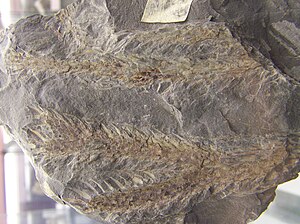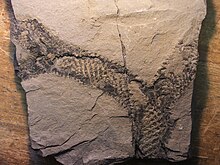Lepidodendraceae
| Lepidodendraceae | ||||||||||||
|---|---|---|---|---|---|---|---|---|---|---|---|---|

Lepidodendron lycopodioides |
||||||||||||
| Systematics | ||||||||||||
|
||||||||||||
| Scientific name | ||||||||||||
| Lepidodendraceae | ||||||||||||
The Lepidodendraceae are a family of extinct bear moss plants , predominantly tree-like, that formed the coal swamps in the Carboniferous . Their representatives are also called shed trees.
features
The distinguishing features ( synapomorphies ) that distinguish the Lepidodendraceae from the other families are bilaterally flattened megasporangia that open distally. With some other representatives they share a complex ring on the microspores and densely granulated microspores.
If the much simplified form of the Hizemodendron is disregarded, the following additional features emerge for the remaining, tree-shaped members of the family: As synapomorphism, they have a parichnos below the leaf, which is visible under the leaf scar. The periderm in the axis is massive and has two to three distinguishable zones. Further features shared with some other representatives of the order are: "resinous" periderm; The height: width ratio of the leaf scars is 1: 1 or less; the vascular bundle of the leaf is flattened dorsiventrally; there are paired pits on the abaxial side of the leaves.
For the characteristics largely shared with the Diaphorodendraceae see Lepidodendrales # characteristics .
Systematics
The Lepidodendraceae are the sister group of the Diaphorodendraceae and together with them they form the so-called "shed trees", after the scaly leaf scars. According to DiMichele and Bateman (1996), the following genera are included in the family:
- Hot modendron
- Lepidodendron
- Lepidophloios
- Sublepidophloiosis
supporting documents
- William A. DiMichele, Richard M. Bateman: The Rhizomorphic Lycopsids: A Case-Study in Paleobotanical Classification . Systematic Botany, 1996, Vol. 21, pp. 535-552.
- Thomas N. Taylor, Edith L. Taylor, Michael Krings: Paleobotany. The Biology and Evolution of Fossil Plants . Second Edition, Academic Press 2009, ISBN 978-0-12-373972-8 . Pp. 279-309.
